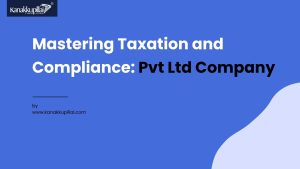![]()
Introduction
Private Limited Companies (PLCs) are India’s most popular business forms. They are suitable for small and medium-sized businesses and provide the benefits of limited liability, separate legal entities, and ease of raising capital. If you plan to start a PLC in India, this article will guide you through registration. This article will discuss the steps for Private Limited Company Registration in India.
Eligibility Criteria for Pvt Ltd Registration in India
To register a Pvt Ltd Company in India, you need to meet the following eligibility criteria:
- A minimum of two shareholders and two directors are required.
- The shareholders and directors can be the same person.
- At least one of the directors must be an Indian citizen and resident.
- The company must have a registered office in India.
Key Takeaways
- A Private Limited Company is a popular business entity in India due to its limited liability protection and other advantages.
- The registration process involves several steps, including eligibility criteria, name reservation, MOA and AOA drafting, and obtaining certificates such as PAN, TAN, and COI.
- It is advisable to seek the help of a professional consultant or Chartered Accountant to ensure that the registration process is completed smoothly.
- Post-registration formalities include opening a bank account, registering for GST, professional tax, EPFO, and ESIC, and complying with regulatory authorities such as the ROC.
- The cost of Private Limited Company registration in India depends on various factors and can range from Rs. 10,000 to Rs. 50,000.
- The time taken to register a Private Limited Company in India can range from 15 to 30 days, depending on various factors such as the availability of documents and approvals.
- Private Limited Companies have various advantages such as limited liability protection, easy transferability of shares, perpetual succession, and access to funding sources such as banks, venture capitalists, and angel investors.
- Private Limited Companies also have certain disadvantages, such as higher compliance costs, restrictions on ownership and management, and difficulty accessing public markets.
- Private Limited Companies must comply with various legal and regulatory requirements such as the Companies Act, Income Tax Act, GST Act, Labor Laws, and Environmental Laws.
- Private Limited Companies can help entrepreneurs and investors to establish a sustainable and profitable business in India with proper planning, execution, and compliance.
Steps for Private Limited Company Registration in India
Private Limited Companies are incorporated under the Companies Act 2013. They are separate legal entities owned by shareholders and managed by directors. PLCs have limited liability, which means that the liability of the shareholders is limited to the amount of their investment in the company. Private Limited Companies are regulated by India’s Ministry of Corporate Affairs (MCA).
1) Digital Signature Certificate
The first step in the Private Limited Company registration process is obtaining a Digital Signature Certificate (DSC) for the proposed directors of the company. A DSC is an electronic signature that is used to sign documents digitally. It is required for all online filings with the MCA.
2) Director Identification Number
The next step is obtaining a Director Identification Number (DIN) for the proposed directors of the company. A DIN is a unique identification number that is allotted to every director of a company. It is required for all online filings with the MCA.
3) Name Reservation
Once you have obtained the DSC and DIN, the next step is to reserve a name for your company. The name should be unique and not be similar to any existing company or trademark. You can check the availability of the name on the MCA website. Once you have selected a name, you can file the name reservation application with the MCA.
4) Memorandum of Association and Articles of Association
The Memorandum of Association (MOA) and Articles of Association (AOA) are the two essential documents required for Private Limited Company registration. The MOA contains the company’s name, registered office address, object clauses, and capital clauses. The AOA has the rules and regulations that govern the company’s internal affairs. Once the MOA and AOA are drafted, they must be filed with the MCA.
5) Certificate of Incorporation
After the MOA and AOA are filed, the MCA will verify the documents and issue a Certificate of Incorporation (COI) if everything is in order. The COI is a legal document that certifies the formation of the company.
6) PAN and TAN Application
After obtaining the COI, the next step is to apply for the company’s Permanent Account Number (PAN) and Tax Deduction and Collection Account Number (TAN). PAN is a unique 10-digit alphanumeric number used to identify individuals, companies, and entities for taxation purposes. At the same time, TAN is a 10-digit alphanumeric number used by employers and businesses to deduct and collect taxes on behalf of the government.
7) Bank Account Opening
Once you have obtained the PAN and TAN, you can open a bank account for your Private Limited Company. You must provide the COI, PAN, and TAN while opening the bank account. It is advisable to choose a bank with experience in dealing with the requirements of Private Limited Companies.
8) GST Registration
If your Private Limited Company is engaged in the supply of goods or services, you must register for Goods and Services Tax (GST) with the GST authority. You must provide the COI, PAN, and other relevant documents while registering for GST.
9) Professional Tax Registration
A professional tax is a tax that the state government levies on individuals and organizations that are engaged in certain professions or trades. If your Private Limited Company is located in a state that levies professional tax, then you need to register for professional tax with the respective state government.
10) EPFO and ESIC Registration
If your Private Limited Company has employees, you must register for the Employees’ Provident Fund Organization (EPFO) and the Employees’ State Insurance Corporation (ESIC) to provide social security benefits to your employees. You must provide the COI, PAN, and other relevant documents while registering for EPFO and ESIC.
11) Compliance with ROC and Other Authorities
After registering your Private Limited Company, you must comply with the rules and regulations of the Registrar of Companies (ROC) and other regulatory authorities. You must file annual returns, maintain statutory registers, and conduct regular board meetings to comply with the regulations.
Conclusion
Registering a Private Limited Company in India is a multi-step process that requires careful planning and execution. You must meet the eligibility criteria, obtain the necessary certificates, reserve a name, draft the MOA and AOA, obtain the COI, and complete the post-registration formalities.
Ready to register a Private Limited Company in India? Contact Kanakkupillai today for professional guidance and hassle-free registration. Our team of experts will assist you at every step of the process and ensure compliance with all legal and regulatory requirements. Don’t let the registration process overwhelm you – let us handle it for you. Contact us now!
Related Services
- Sole Proprietorship Registration in India
- GST Return Filing in India
- Income Tax Return Filing in India






